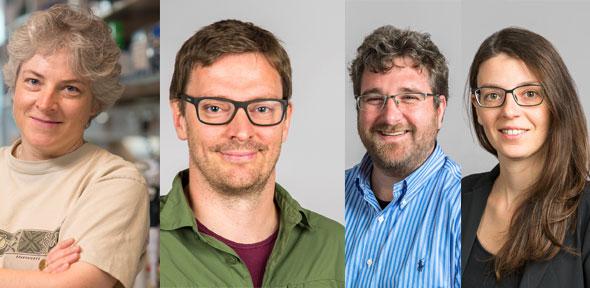
Four Cambridge researchers are among the 2018 winners of the Royal Society of Chemistry's prizes and awards, celebrating the outstanding work happening in every corner of the scientific community.
Dr Judy Hirst, who leads a research group at the MRC Mitochondrial Biology Unit, is the Royal Society of Chemistry Interdisciplinary Prize winner for 2018. Her work focuses on understanding an enzyme called respiratory complex I, which catalyses the process by which the energy consumed in food is captured, converted and stored. Understanding how complex I works is necessary to understand and address its many roles in human health and disease. The Interdisciplinary Prizes are awarded for work at the interface between chemistry and other disciplines. Dr Hirst receives £5000 and a medal and will complete a UK lecture tour.
Professor Erwin Reisner from the Department of Chemistry is the Royal Society of ChemistryCorday-Morgan Prize winner for 2018. His work focuses on advancing the fundamental science of sunlight-driven chemistry, which could help solves the challenge of sustainable energy. The Corday-Morgan Prize is awarded for the development of solar-driven catalysis with molecularly engineered semiconductors and semi-artificial photosynthesis. Professor Reisner receives £5000 and a medal.
Professor Oren Scherman, also from the Department of Chemistry, is the Royal Society of Chemistry Corday-Morgan Prize winner for 2018. His work focuses on bringing long chains of molecules called polymers together in a controlled way in water to make hydrogels. These gels can be used for a wide range of applications including slow, controlled release of therapeutics for the treatment of diseases such brain cancer. The Corday-Morgan Prize is awarded for ground-breaking discoveries in supramolecular chemistry. Professor Scherman receives £5000 and a medal and will complete a UK lecture tour.
Dr Silvia Vignolini, also from the Department of Chemistry, is the Royal Society of Chemistry Gibson-Fawcett Award winner for 2018. Dr Vignolini studies how optical structures – such as the iridescence used by many animals for mating or camouflage, or the complex systems that plants use to boost photosynthesis – are made in nature. She uses this to design manufacturing methods for synthetic materials with similar properties. Dr Vignolini studies how optical structures – such as the iridescence used by many animals for mating or camouflage, or the complex systems that plants use to boost photosynthesis – are made in nature. He uses this to design manufacturing methods for synthetic materials with similar properties.
Dr Robert Parker, chief executive of the Royal Society of Chemistry said:
“The chemical sciences are vital for the well-being of our world and chemical scientists help to change people’s lives for the better. That’s why we’re so proud to celebrate the innovation and expertise of our community through our Prizes and Awards.
“This year’s inspiring and influential winners come from a range of specialisms, backgrounds, countries and communities. Each has done their bit to advance excellence in the chemical sciences – to improve the lives of people around the world now and in the future.”
